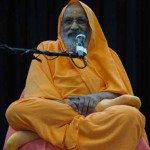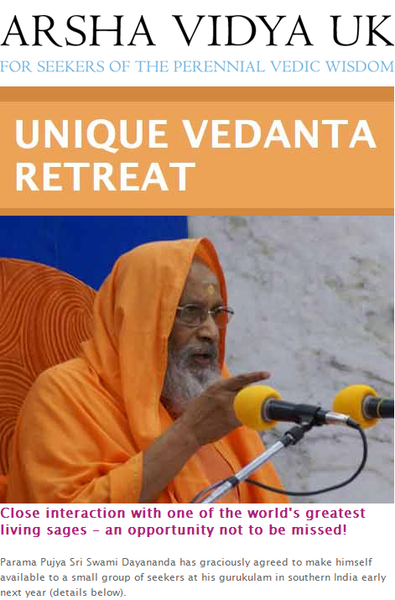
I have just been informed that Swami Dayananda has given permission to open a Twitter account for posting his sayings. For those who indulge in such things, the ‘Twitter handle’ is @swamijisays. I guess that they are likely to provide more worthwhile reading than most tweets…
Tag Archives: Dayananda
What is Brahman? (Part 3)
The superficially contradictory ‘descriptions’ of Brahman as ‘neti, neti’ and ‘sarvaM khalvidaM brahma’ [all this is verily Brahman] are brought out in adjacent verses of the Atma bodha, attributed to Shankara (Swami Chinmayananda translation):
- Brahman is other than this, the universe. There exists nothing that is not Brahman. If any object other than Brahman appears to exist, it is unreal like the mirage.
- All that is perceived, or heard, is Brahman and nothing else. Attaining the knowledge of the Reality, one sees the Universe as the non-dual Brahman, Existence-Knowledge-Bliss-Absolute.
Here, it is first stated that the universe is not Brahman. But it is also said that any other appearance will be unreal, like a mirage. The mirage is a powerful metaphor because the water that appears is in reality only the sand upon which the appearance takes place. I.e. sand is the substratum of the water appearance, just as Brahman is the substratum of the world appearance. It is then stated that all appearances are, in fact, nothing other than Brahman. But this is realized, of course only upon enlightenment. Until then, the world remains very real. Similarly, to the seeker after water in the desert, the mirage is very real. Continue reading
What is Brahman? (Part 1)
 Enlightenment is the realization in the mind of a person that ‘I am Brahman’. So what is this ‘Brahman’ that I am supposed to realize? Knowing this must constitute a significant aspect of the Self-knowledge that I need to acquire in order to become enlightened.
Enlightenment is the realization in the mind of a person that ‘I am Brahman’. So what is this ‘Brahman’ that I am supposed to realize? Knowing this must constitute a significant aspect of the Self-knowledge that I need to acquire in order to become enlightened.
(The following analysis is loosely based upon Swami Paramarthananda’s talks on Shankara’s bhAShya [analytical commentary] on the Brahma Sutra.)
Before we can investigate anything, two criteria must be satisfied:
1) We must know what it is we are investigating (a definition)
2) We must have an appropriate means of acquiring data (a pramANa). Continue reading
Knowledge and the Fruit of Knowledge
 Following on from the l-o-n-g discussion we had on this topic under the thread ‘akhaNDAkAra vRRitti – The End of Suffering‘, I have written what was intended to be the commentary on kArikA 3.40 in my next book (OM: Waking Dreams… and Reality), which covers the essence of this discussion. I have decided that I will probably simplify this considerably for the book, because it is intended to be an accessible and readable book, rather than an academic one. But, because of its relevance, I am posting the entire section, as first written, below.
Following on from the l-o-n-g discussion we had on this topic under the thread ‘akhaNDAkAra vRRitti – The End of Suffering‘, I have written what was intended to be the commentary on kArikA 3.40 in my next book (OM: Waking Dreams… and Reality), which covers the essence of this discussion. I have decided that I will probably simplify this considerably for the book, because it is intended to be an accessible and readable book, rather than an academic one. But, because of its relevance, I am posting the entire section, as first written, below.
You now know all about adhyAropa and apavAda and acknowledge that all of the teaching is only interim, to be used to lead us to the final understanding and then discarded. The corollary to this is that, in principle at least, any teaching could be used for this purpose. If it works, it is valid. So it is hardly surprising that there are other methodologies altogether, which can have the same ultimate purport, e.g. Zen Buddhism, Taoism, Kabbalah etc. (I don’t have any personal knowledge of these other systems but understand that their essential teaching is non-dual.)
As far as Advaita Vedanta is concerned, the finer details of the teaching differed from one teacher or branch to another, both before and after Shankara. And some modern-day proponents tend to adhere to some elements and some to others that are apparently contradictory. None of this matters in the final analysis but does tend to lead to some quite heated discussions on the Internet! Continue reading
Action – Enlightenment
Results of action are of four types:
1) utpAdya – a result in the form of a product, like a pot.
2) Apya – a result in the form of reaching, like going abroad or to heaven.
3) saMskArya – a result in the form of removal of impurity and imparting a good qualiity.
4) vikArya – a result in the form of modification, e.g. milk to yoghurt.
Making, reaching, purifying and modifying are the four results obtained by karma. mokSha (enlightenment) is not a product because it is nitya (eternal). It cannot be reached because it is you. It cannot be purified because it is free from blemish. It cannot be modified because it is one whole. Hence, nitya-mokSha is not a product or by-product of karma.
muNDakopaniShad (Vol. 1), Swam Dayananda Saraswati, Arsha Vidya Centre. ISBN 81-903636-3-8.
Swami Dayananda retreat
 This specially arranged 16–day retreat (15–30 January) offers the rare privilege of sitting at the feet of a master teacher. There will be several classes a day, each day ending with a question and answer satsang. The retreat will be followed, from the 31st, by a further 4–5 days of optional visits to sites of historic importance, including Sringeri Math.
This specially arranged 16–day retreat (15–30 January) offers the rare privilege of sitting at the feet of a master teacher. There will be several classes a day, each day ending with a question and answer satsang. The retreat will be followed, from the 31st, by a further 4–5 days of optional visits to sites of historic importance, including Sringeri Math.
The ashram is situated in beautiful, peaceful forest 45 minutes drive from Coimbatore.
See more details.
Vedanta – New Series
 Advaita Vision is pleased to announce the commencement (very soon) of the serialization of this brilliant book on Vedanta by Sri D. Venugopal, a direct disciple of Pujya Swami Dayananda, Swami Paramarthananda, Swami Siddhabodhananda and Swamini Pramananda. The book is designed to be the ‘next level up’ from an Introduction but does not assume any prior knowledge. We published an extract from this book – ‘Vedanta: the solution to our fundamental problem’ – in April 2013 but, now, Sri Venugopal has kindly given his permission for the entire book to be serialized so that all may benefit. The book is remarkable for the clarity of its expression and the copious cross-references to scriptures.
Advaita Vision is pleased to announce the commencement (very soon) of the serialization of this brilliant book on Vedanta by Sri D. Venugopal, a direct disciple of Pujya Swami Dayananda, Swami Paramarthananda, Swami Siddhabodhananda and Swamini Pramananda. The book is designed to be the ‘next level up’ from an Introduction but does not assume any prior knowledge. We published an extract from this book – ‘Vedanta: the solution to our fundamental problem’ – in April 2013 but, now, Sri Venugopal has kindly given his permission for the entire book to be serialized so that all may benefit. The book is remarkable for the clarity of its expression and the copious cross-references to scriptures.
Short questions and answers No. 3
Here are a few more short Q & A’s which do not merit a separate post of their own: (Dennis’ answers, so don’t blame any of the other bloggers!)
Questions addressed are: how to improve one’s life; the value of japa meditation; who it is that removes ignorance; and (that perennial favorite) why bother seeking enlightenment? Continue reading
Witnessing Consciousness – Q.340
Q: What is the difference between the witness, witness consciousness and consciousness? I know myself as the witness or maybe as witness consciousness but I do not know myself as all there is which, I guess, would be knowing myself as consciousness. But how can I ever not see the world of objects? So do I not remain a witness choicelessly?
A (Sitara): Contained in your question are seven questions (which I have passed on to the other bloggers, so some may refer to them):
1. What is the difference between the witness, witness consciousness and consciousness?
This will be answered below along with the last question.
2. (implied question) Is there a difference between the witness and witness consciousness?
Answer: no, not in the way I use the terms. But there is the possibility of a flawed use of the term ‘witness’. Witness means the ultimate subject that cannot be objectified. If witnessing is attributed to the mind, the so-called witness is nothing but a thought, i.e. it is just another object. And the so-called witnessing is nothing but an experience.
If, however, witness is used in the sense of ‘ultimate subject’, you can use ‘witness’ and ‘witness consciousness’ interchangeably. I prefer the term ‘witness consciousness’ (or simply ‘witnessing’) because the term ‘witness’ suggest too much of a personality. Continue reading
Reincarnation – Q.335
Q: As you know, all spiritual traditions in Tibet, many in India and even the early Christians took reincarnation for granted.
In Advaita however the idea is blatantly refused. Balsekar says, since there is no ego and the idea of an individual person is an illusion, what or who is there to be reincarnated?
Does this mean that the other traditions are wrong or is it a question of understanding, meaning that the people who argue differently do so from a different level of understanding / consciousness? Continue reading

